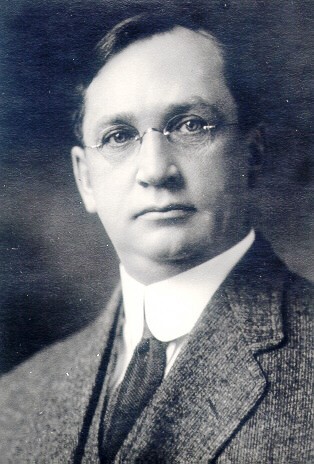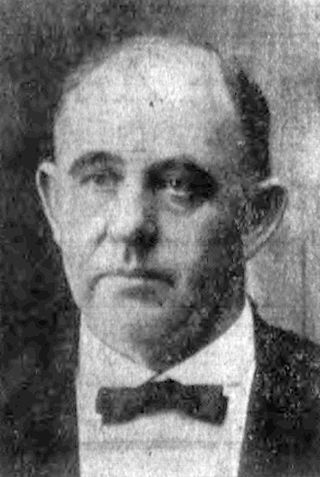
Cecil Dale Andrus was an American politician who served 26th and 28th governor of Idaho, for total of fourteen years. A Democrat, he also served as U.S. Secretary of the Interior from 1977 to 1981 during the Carter Administration. Andrus lost his first gubernatorial election in 1966, but won four and his fourteen years as governor is the most in state history. He is the most recent Democrat to have held the office.

Frank Steunenberg was the fourth governor of the State of Idaho, serving from 1897 until 1901. He was assassinated in 1905 by one-time union member Harry Orchard, who was also a paid informant for the Cripple Creek Mine Owners' Association. Orchard attempted to implicate leaders of the radical Western Federation of Miners in the assassination. The labor leaders were found not guilty in two trials, but Orchard spent the rest of his life in prison.

Frank Williams Hunt was the fifth governor of Idaho from 1901 until 1903.

The Supreme Court of Illinois is the state supreme court, the highest court of the State of Illinois. The court's authority is granted in Article VI of the current Illinois Constitution, which provides for seven justices elected from the five appellate judicial districts of the state: three justices from the First District and one from each of the other four districts. Each justice is elected for a term of ten years and the chief justice is elected by the court from its members for a three-year term.

Thomas Mead Bowen was a state legislator in Iowa and Colorado, a Union Army officer during the American Civil War, a justice of the Arkansas Supreme Court, briefly the Governor of Idaho Territory, an elected judge in Colorado and a United States senator from Colorado.

John Frost Nugent was an American attorney and Democratic politician from Idaho. He served three years in the United States Senate, from 1918 to 1921.

Frank Robert Gooding was a Republican United States Senator and the seventh governor of Idaho. The city of Gooding and Gooding County, both in southern Idaho, are named for him.
The Chief Justice of Western Australia is the most senior judge of the Supreme Court of Western Australia and the highest ranking judicial officer in the Australian state of Western Australia. The chief justice is both the judicial head of the Supreme Court as well as the administrative head. The chief justice is responsible for arranging the business of the court and establishing its rules and procedures.

William George Thompson was a Civil War officer, trial-court judge, territorial justice, and Republican Representative in the United States House of Iowa's 5th congressional district.

Lewis Hobart Sweetser was a Republican politician from Idaho. Born in San Francisco, he attended the University of California, Class of 1889, where he was a member of the Chi Phi Fraternity. Sweetser served as the 11th lieutenant governor of Idaho from 1909 to 1913 during the administrations of Governors James H. Brady and James H. Hawley. He lived in Burley, Idaho.

John George "Pink" Griffith was an American football player and coach of football, basketball, and baseball.
The Philippine Commission was the name of two bodies, both appointed by the president of the United States, to assist with governing the Philippines.

Sir George Thomas Michael O'Brien was a British colonial official who served as Colonial Secretary of Hong Kong from 1892 to 1895, and as Governor of Fiji and High Commissioner for the Western Pacific from 1897 to June 1901.

The Idaho Supreme Court is the state supreme court of Idaho and is composed of the chief justice and four associate justices.

Samuel Hubbard Hays was an American politician and attorney who served as the Idaho Attorney General from January 2, 1899, until January 7, 1901, and as mayor of Boise, Idaho, from 1916 to 1919.

James Tufts was a United States politician and acting governor of Montana Territory in 1869.
Idaho v. United States, 533 U.S. 262 (2001), was a United States Supreme Court case in which the Court held that the United States, not the state of Idaho, held title to lands submerged under Lake Coeur d'Alene and the St. Joe River, and that the land was held in trust for the Coeur d'Alene Tribe as part of its reservation, and in recognition of the importance of traditional tribal uses of these areas for basic food and other needs.

Ralph Petty Quarles was an associate justice of the Idaho Supreme Court from 1897 to 1901, serving as Chief Justice of that court from 1901 to 1903, and later an associate justice of the Supreme Court of Hawaii from 1914 to 1918.
Robert Newton Dunn was Justice of the Idaho Supreme Court from 1921 to 1925, serving as chief justice from January 5, 1924, until his death in 1925.

The 1906 Idaho gubernatorial election was held on November 6, 1906. Incumbent Republican Frank R. Gooding defeated Democratic nominee Charles Stockslager with 52.18% of the vote.















